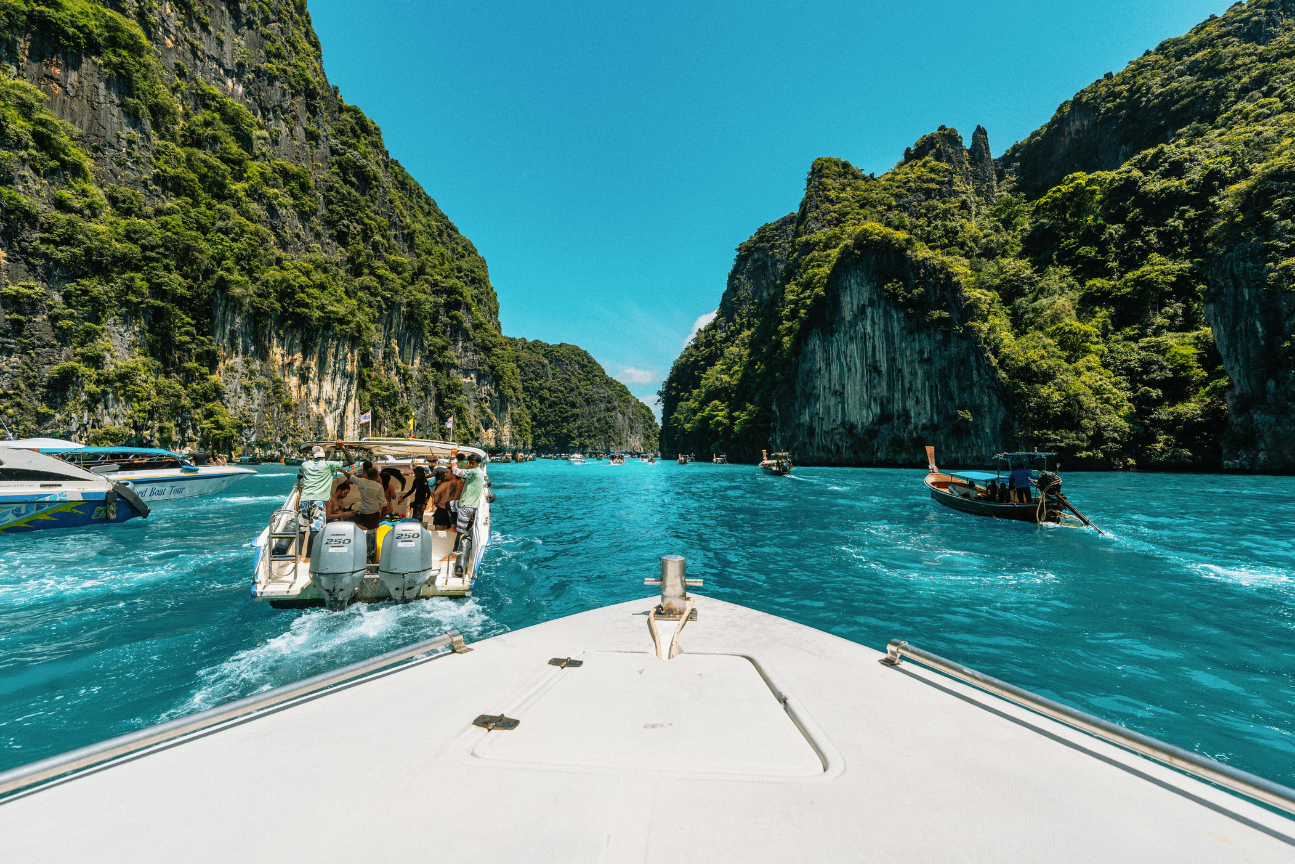In today's competitive tourism industry, having a high-converting marketing strategy is crucial for standing out and attracting more visitors to your destination or experience.
Whether you're looking to refine your approach or implement new tactics, focusing on these key areas can help skyrocket your business in the tourism market.
What is Tourism Marketing?
Tourism marketing is the strategy businesses use to promote their destinations, activities, and experiences to potential visitors. It's about communicating the unique aspects of your brand and location in a way that engages and attracts your target audience.
By implementing effective marketing strategies, you can differentiate from competitors and attract more customers.
Different Types of Tourism Marketing
Tourism marketing encompasses a variety of strategies tailored to attract different segments of travelers to a destination, activity, or experience.
By understanding and implementing these different types of tourism marketing, businesses can more accurately target their desired audience, differentiate themselves in a crowded market, and create compelling reasons for tourists to choose their offerings over competitors.
Location Marketing
Location marketing focuses on promoting a specific place or destination. It's about showcasing the attractions, promoting local culture, and unique experiences available. Engage your audience by sharing photos, reviews, and insights about the destination.
When you hear the name of a continent or country, certain destinations instantly spring to mind. Mention "Europe," and images of the UK, Spain, France, or Italy might float through your thoughts, regardless of whether you've visited these places. What drives this phenomenon?
This is the power of destination marketing, a prevalent approach in the travel and tourism sector. The aim is to draw customer focus to a particular locale.
Instead of focusing on a single attraction or place to stay, destination marketing showcases the entire area as a must-visit travel spot. Through this strategy, marketers capture the essence of a place, making it top-of-mind for potential travelers by highlighting its overall appeal and unique experiences.
Activity Marketing
Activity marketing targets travelers interested in specific activities or experiences, such as hiking, wine tasting, or art tours. Showcase the experiences you offer and differentiate your services from others.
Activity Marketing occurs when tourism marketers focus on promoting a specific activity tied to a particular location. This marketing approach encompasses a broad spectrum of tourist activities, including adventure sports, culinary tours, and visits to art galleries.
The growing interest in the activity rental revolution shows how tour operators can tap into emerging trends to attract experience-driven tourists.
If your objective is to spotlight a unique experience or activity, adopting Activity Marketing is the strategy to pursue. This method effectively draws attention to distinct things travelers can engage in, enhancing the appeal of a destination through its diverse offerings.
Corporate Marketing
Corporate marketing in tourism promotes the brand as a whole. It's about building a strong brand identity and positioning your business as a leader in the tourism industry. Communicate your values, mission, and the overall experience customers can expect.
Envision a corporate executive traveling abroad for a meeting or conference. Their focus isn't on the leisure activities a destination offers.
This is where corporate marketing comes into play within the realm of tourism marketing. It's a strategy that allows professionals to showcase destinations as ideal venues for business events. By doing so, they can elevate the profile of these locations among the corporate sector, capitalizing on the influx of professionals congregating for events, thereby generating popularity and profit from the business tourism segment.
What are the Best Tourism Marketing Strategies?
The most effective tourism marketing strategies are those that adeptly combine an in-depth understanding of target audiences with the innovative use of digital tools and platforms. Together, these strategies form a comprehensive approach to attracting visitors, enhancing their engagement, and ultimately driving bookings.
Research Customer Needs
The initial step in crafting an effective tourism marketing strategy is gaining a deep understanding of your perfect customers.
It's crucial to gather demographic details and insights into their booking behaviors and preferences. During this analysis, consider questions like: What influences their travel decisions? Where do they look for destination information? What are their preferred booking methods? What aspects of the research and booking process frustrate them?
For instance, understanding the best ways to reach the Chinese travel market may involve tailoring content for platforms like WeChat or Ctrip, which are more popular with that audience.
From this information, create at least three detailed customer personas. These personas will serve as the foundation for tailoring your branding, website, and overall marketing approach.
Remember to also focus on your business's unique selling points and core motivations. Highlighting these in a way that resonates on a personal level with your audience is key to connecting with them more effectively.
Build an Experiential Website
Your website is the foundation for all your internet marketing efforts. As such, you should optimize it frequently to improve user experience and boost your conversion rates.
If your site performs poorly on mobile, is cluttered, too slow, or just too old, you definitely need to optimize it.
Create a website that showcases the experiences your destination offers. Your website should reflect your identity and build brand awareness. Use engaging content, videos, and photos to communicate the value of your tours and activities.
Focus on Mobile
With most travelers using smartphones for planning and booking, optimize your online content and booking process for mobile devices. Your booking flow should be fast and mobile-friendly to optimize customer experience.
Social Media Platforms
Social media stands as a highly potent marketing avenue within the tourism sector, especially when the appropriate platform is selected to meet customers where they are, accompanied by a tailored strategy for each.
Facebook shines as a premier choice for tour and activity providers aiming to drive website traffic. Despite its vast user base, targeted advertising and specific strategies can help you connect with your niche audience effectively.
With a billion monthly active users, Instagram offers a vast audience for brand exposure. Its emphasis on visual content makes it an ideal platform for showcasing destinations. The introduction of IGTV in 2018, catering to vertical long-form video content on mobile, has seen a significant uptake. Marketers and brands leverage this feature to enhance engagement and improve conversion rates, tapping into the growing trend of mobile video content.
To further enhance your marketing efforts, explore these 9 effective marketing strategies for tour and activity operators, offering a deep dive into practical tactics that can significantly boost your visibility and bookings.
Video Marketing
Videos are a powerful way to showcase destinations and experiences. Share videos on your website and social media to attract and engage potential visitors.
Email Marketing Pro
Launch targeted email campaigns to keep your audience informed about new tours, special offers, and insights about your destination. Personalize your messages to increase engagement and conversion rates.
Blog Regularly
Your customers want to hear from you. They want knowledge and insights from you, i.e. a blog. Blogging is a good way to tell stories, share unique insights about the destination, share travel tips, etc.
It’s also a good way to reel in your audience and advertise your expertise in the field. If you do not currently have a blog, create one and blog on a consistent schedule.
Share valuable information, travel tips, and destination guides through regular blog posts. And make sure to target keywords that attract new visitors searching for local tours. Topics like “tour operator versus DMCs versus OTAs” can help you rank for comparison queries while establishing credibility with travelers researching their options. This not only engages your audience but also improves your website's SEO.
Target Different Tour Marketing Channels
Relying on one platform limits your reach. Instead, diversify your marketing across social media, email, paid ads, and local partnerships. Use Instagram or TikTok to share short videos and user content that inspires bookings. Send segmented email campaigns to connect with different traveler types, such as first-timers, thrill-seekers, or returning guests.
If you're looking for immediate visibility, try pay-per-click (PPC) advertising on Google or social platforms. When targeting high-intent search terms like “kayaking tours near me,” PPC can deliver fast results and strong ROI. You can also consider partnerships with local hotels or restaurants to cross-promote each other’s services.
Consider Influencer Collaborations
The right influencer can help you reach new travelers with authentic, trust-building content. Start by looking for local creators or travel bloggers who target niche markets that match yours (adventure seekers, foodies, or eco-tourists).
You can offer a free experience in exchange for content like Reels, blog posts, or Stories. Encourage them to share personal takeaways as well, not just promos, as genuine narratives convert better. Use booking codes or affiliate links to track results, and prioritize ongoing relationships with influencers who consistently drive bookings.
Loyalty Programs
Loyalty programs drive repeat visits and even brand advocates. Offer 10–15% off return bookings to reward those repeat visits. Give loyal guests early access to new tours or exclusive perks like private experiences. You can also set up a points-based system where customers earn rewards for bookings or referrals, think 100 points per friend who books.
In fact, many travelers today even stack multiple programs to unlock upgrades they wouldn’t normally splurge on. According to the 2025 Global Travel Trends Report, 66% of travelers say combining travel and credit card rewards offers the best value for international trips.
Sustainability Practices
Eco-conscious travel is on the rise, and your tours can stand out by going green. Promote sustainability. Even small acts can appeal to mindful tourists and boost your brand reputation.
You may consider using hybrid vehicles, reducing single-use plastics, or partnering with conservation groups. You can also offer “green tours” with zero-waste policies or nature-based activities that support local ecosystems.
Tourism Trends: Opportunities for Destination Marketing
Embrace new technologies and trends, such as virtual reality tours or sustainable travel options, to attract a broader audience. Leverage these trends in your marketing campaigns to stand out in the market. Some of the latest trends to look out for are:
- Digital Marketing
- Personalization
- Sustainability
- Emphasis on Local Culture
- Collaboration
Keeping up with evolving preferences is key to a successful strategy. Delve into our comprehensive analysis of current travel marketing trends, focusing on personalization and customization to attract a broader audience.
Key Takeaways
- Know your audience to create targeted marketing that resonates and drives bookings.
- Develop an online presence to reach travelers where they research and plan.
- Use content marketing to stay visible, boost SEO, and highlight your expertise.
- Adapt to trends like sustainability and tech to stand out in a competitive market.
Frequently Asked Questions
How Can I Identify the Target Audience for My Tourism Marketing Campaign?
Analyze market research, customer data, and social media insights to understand the demographics, interests, and preferences of your potential customers.
Are There Any Ethical Considerations in Tourism Marketing?
Yes, it's important to promote responsible travel and respect for local cultures and environments. Ensure your marketing materials communicate these values.
How Can I Measure the Success of My Tourism Marketing Strategies?
Utilize analytics and conversion tracking tools to measure the effectiveness of your campaigns. Evaluate engagement, booking rates, and revenue to optimize your strategies for better results.












